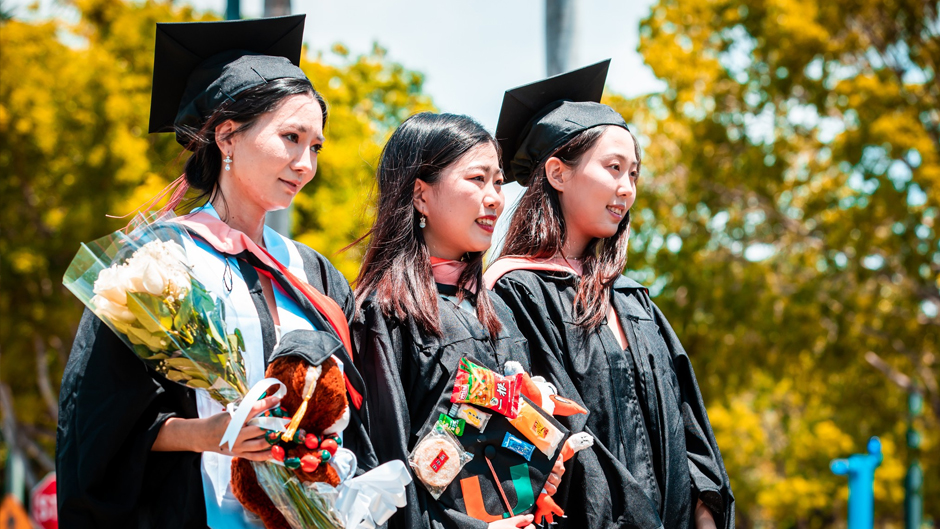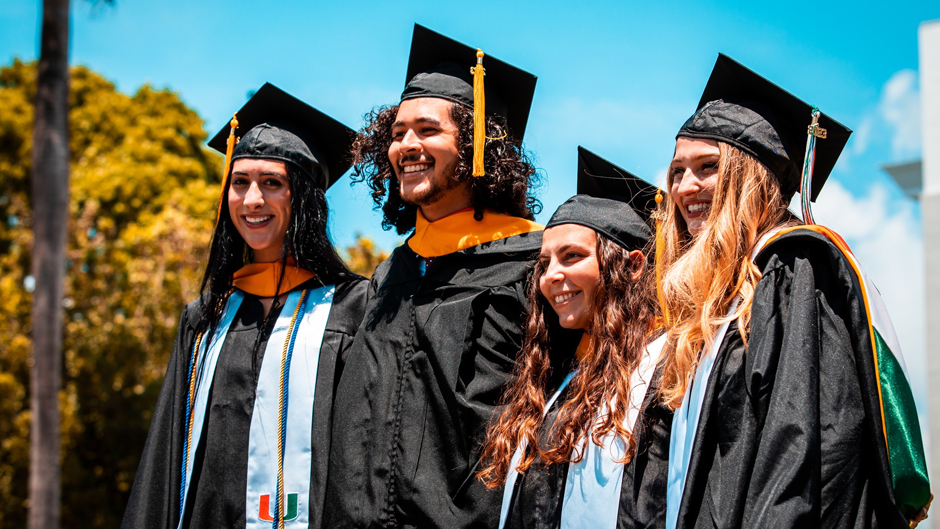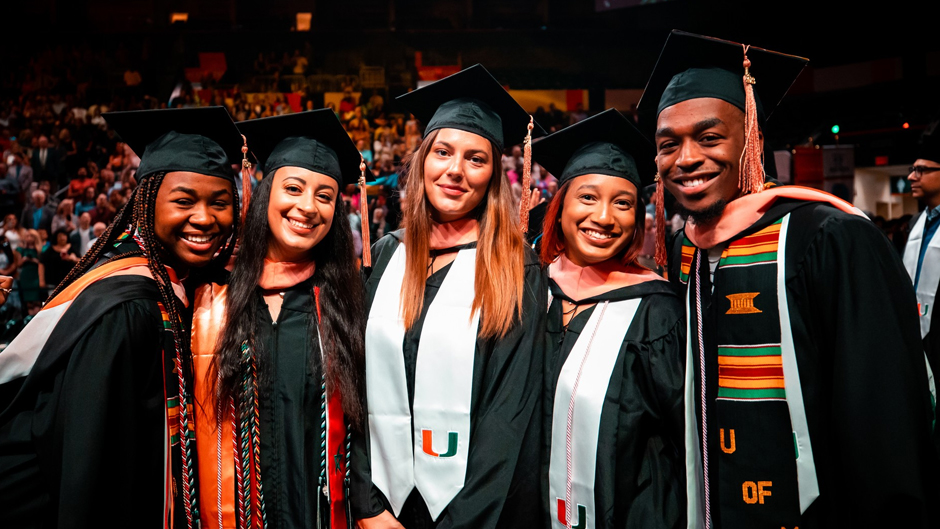Thursday’s speakers at two graduate ceremonies at the University of Miami featured a renowned academic who has pioneered advances in mindfulness training, and a television news commentator who grew up in Miami and spoke about the wonderous benefits of being raised a Hurricanes fan in a city that is “constantly morphing, ever inclusive, and wildly unpredictable.”
During the morning ceremony, speaker Amishi Jha, neuroscientist and professor of psychology in the Division of Cognitive and Behavioral Neuroscience, urged new graduates to embrace the practice of mindfulness as a critical tool to better manage life’s most difficult challenges and to enhance savoring its joys.
Jha, whose lab has made groundbreaking advances in scientific understanding of the mind, shared insights on the power of paying attention with students in attendance from the Graduate School; College of Arts and Sciences; College of Engineering; Rosenstiel School of Marine, Atmospheric, and Earth Science; Miller School of Medicine; and the School of Nursing and Health Studies.
The speaker at the afternoon ceremony was Chuck Todd, NBC News’ political director and the moderator of the network’s flagship public affairs program, “Meet the Press,” and who is also an honorary alumnus of the U. The five-time Emmy Award winner, who grew up in Miami and has been a Miami Hurricanes fan since childhood, delivered an ode to his hometown.
“I was literally born a Hurricane,” Todd told the audience.
The latter graduate ceremony brought together the doctorate and master's degree candidates from the School of Architecture, the Miami Herbert Business School, School of Communication, School of Education and Human Development, and the Frost School of Music.
View photos and video from the 2023 Commencement Ceremonies
Special Report: Student profiles, special event coverage and more
In advance of both keynote speakers, President Julio Frenk celebrated the graduates, recognizing the global crises they endured while persevering toward their degrees—wearing masks, social distancing, and making sacrifices for their education.
“Going through these experiences while pursuing an advanced degree has given you the opportunity to learn—and practice—adaptability and resilience,” Frenk said. “No matter where your paths take you, I can guarantee you this: You will continue to use those skills.”
In her address, Jha told the students and their family and friends that “when the going gets tough, when there’s no clear path forward, when a solution doesn’t yet exist, this is when your attention will be most needed to fuel successful outcomes,” Jha said.
Attention is vulnerable to wavering and distraction, especially under stressful circumstances, she said, but the good news is that it’s also trainable.
“With your attention charged up and presence centered, you will be able to more fully experience moments of joy and celebration like today,” Jha said. “You’ll be more present to savor the good in your life, receive and extend care to your loved ones, and hold your own heart when times are tough. You’ll be able to maneuver through your life with greater ease and clarity.”
Jha highlighted two metaphoric tools that are critical for students traversing the pathway of graduate study: a map—a cognitive and continually deepening understanding of their field—and a flashlight—the focus of attention.
Faculty members who academically guide graduate students continually strive to ensure that they are deepening the map that students came with and modeling how to walk through the moments of uncertainty and fear—essential to the learning process.
“But the reason you are here today is not because you have a higher resolution map,” Jha said. “You are here today because you made excellent use of that other tool you had in your possession: the flashlight metaphor.”
The neuroscientist shared that more than 15 years of researching the impact of mindfulness on Marine special forces, football players at the University, teachers, students, first responders, and others revealed that attention can be effectively trained.
“Whatever you direct your attention towards receives privileged access to the brain’s computational resources,” she pointed out. “As a result, paying attention to something allows it to appear crisper, clearer, and more salient—like shining an actual flashlight on something.”
Attention is that glue that hyperlinks idea to idea to idea, which allows us to have coherent trains of thought, she explained. We use it to connect with others by collaborating, communicating, and cocreating shared mental models and to regulate our emotions.
Because of its power and importance in our lives, she recommended a practice of as little as 12 minutes a day to protect and strengthen the capacity to pay attention.
“Over time, if you make mindfulness practice a habit, it becomes a way to charge up your flashlight of attention. And with full access to your flashlight, you can optimize not only your success in life but your fulfillment, too,” she said.
Jha encouraged the new graduates to do the mental push-ups that will help them heed their attention.
“Remember your flashlight, use it well and make sure it’s fully charged,” Jha urged.
Student speaker Roxana Lemus, graduating with a Master of Public Administration from UOnline, urged her fellow graduates at the morning ceremony to never let anyone diminish their light.
“People may try to minimize you, but no one can diminish the core of who you are,’’ Lemus said. “We are all essential. I think we all have a duty in life to pass the baton along.’’
With a bachelor’s degree in political science and several years of experience as a victim advocate, Lemus continued to work full time while taking two seven-week classes per semester as she pursued her master’s degree.

“I never felt like it’s just a computer in front of me,’’ she said of the UOnline program, its advisors, and professors. “I truly felt like I was a part of UM and taking classes on campus in Miami,” she declared. “They treat you as a human being, not just a number or a face on the screen. Every professor I had elevated me and empowered me in some way.”
Victoria Bennett, who hails from a small town just outside of Atlanta, Georgia, received her master’s degree in public health. She credited her own hard work and the support of her mentors for the achievement, especially professor JoNell Potter, vice chair of Reproductive Sciences and director of the THRIVE Clinic at the University of Miami Miller School of Medicine.
“Now that I’ve accomplished this, my plans after graduation are to go into qualitative research thanks to the most amazing professor I’ve ever had—JoNell Potter. I want to spend my time addressing health equity issues,” Bennett said.
Annachiara Piubello spent six years in Miami away from her family in Verona, Italy, while she pursued a Ph.D. in mathematics at the University.
“I’ve been waiting for this day for a long time, and it’s been a long way here,” said Piubello, who took photos with her parents Simonetta and Aldo, and older brother, Francesco. “Also, there is nothing this grandiose in Italy for graduation, so I wanted my family to experience it with me.”
Piubello plans to go into academia and is starting a postdoctoral program at the University of Potsdam in Germany next fall.
Austin Wells graduated Thursday with his master’s degree in public health sciences, a two-year program based at the Miller School of Medicine.
“What a relief,” he said. “I’m also nervous about the change because I am so used to academia, and now I’ll be hitting the workforce. But I am excited about that and what’s next.”

Wells celebrated with his mother, aunt, father, and stepmother outside the Watsco Center. He plans to find a job in community health and sustainability near his hometown of Fontana, California.
Alexa Hoops was ecstatic to celebrate her status as a new graduate—especially since she didn’t attend her undergraduate ceremony.
“It feels incredible to graduate,” said Hoops, who earned her doctorate in physical therapy. “I didn’t get a graduation from undergraduate because of the pandemic, so this means so much more now that I get to celebrate with the people I love around me.”
To mark the occasion, Hoops’ mother, who is Hawaiian, brought some leis from their Reno, Nevada, home. Joining her were Hoops’ boyfriend, Abe; her father; and her stepfather.
During the afternoon ceremony, Todd told the audience that both his parents were Hurricanes fans, and that his daughter is a sophomore at the University. “It is the home of some of my best childhood memories. Of all days to say that, ‘It is great to be a Miami Hurricane,’ today is that day.”
Todd thanked Frenk for his leadership during the COVID-19 pandemic.
He told the students that growing up in Miami had prepared him to be able to do his job and cover politics in the 21stcentury.
“The education you receive in this institution and from living in this community—if only for a few years—is going to set you apart and help you get ahead,” he said. “It has for me.”
Todd said that as he grows older, he greatly values the education both Miami and the University gave to him, because “tomorrow’s challenges Miami faces today.”
He said that all the challenges that affect this country had been faced by Miami. And that this is where he learned to disagree with people and still respect them and to appreciate people’s cultural backgrounds instead of dismissing them.
Todd noted that he also learned to “embrace the very idea that Miami rests on, that makes it the quintessential embodiment of America’s core principles: That in a beautiful, chaotic diversity, there is a special kind of harmony.” He warned that in this “unsettling American era that we are living in,” Miami can teach many lessons that we desperately need.”
He recounted that he grew up in Miami in the ’70s and ’80s, a transformative time in the area. He even pointed out that in 1980, there was a dispute about what the official language should be, and the city was stereotyped by the show “Miami Vice”
When he moved to Washington, D.C., Todd said that many people were surprised to learn that he was from Miami. They would say, “You don’t look like you are from Miami.”
But he said there is no single way that someone from Miami looks. “There is no race, no intellect, no career, and no amount of sunburn that can capture Miami in a nutshell,” Todd emphasized. “It is beautifully evasive in that way, constantly morphing, ever inclusive, wildly unpredictable,” he continued. “I grew up in a city that is closer to the embodiment of what it is to be an American than any other city. Miami is a beacon for people.”
He told the graduates that they had the opportunity to experience Miami and they have absorbed these attitudes, “this openness to embrace that which is distinct but united at the same time.” This is something that is not the norm in other areas of the U.S. these days, according to Todd. Cultural disharmony and huge changes in how people receive and process information have created divisiveness, he explained.
“The world is made of shades of grey and made up of leaders who have to do their best in that greyness knowing that nothing is certain and that their integrity has to matter more than any person’s opinion,” the “Meet the Press’’ moderated imparted.
“My advice to you is to embrace the grey and take comfort in understanding that you will not be completely right. Instead strike the best possible balance knowing that,” he said. “Learn to disagree, don’t surround yourself with people you agree with. Surround yourself with people you like.”
At the end of Todd’s speech, Frenk told him that he had learned that Todd’s birthday was on April 8, which happens to be the date the University of Miami was founded.
“So, we hope you come back on April 8, 2025, to celebrate with us,” Frenk said, referring to the University’s centennial birthday.
Christopher Clarke, director of the University’s Office of Multicultural Student Affairs, served as the student speaker at the Thursday afternoon ceremony. He was earning his doctorate in education, which is the Miami native’s first degree from the University.
Clarke said that he feels fortunate to be graduating because his own paternal grandparents, Leroy and Virginia Clarke, served as indentured servants, cleaning house and doing landscaping for residents near the Coral Gables Campus. Their struggle extended to his own father, who sacrificed his education to support his family, but Clarke had the opportunity to get a college—and now graduate school—education. To ensure that other minority students like himself have a chance to pursue higher education, Clarke announced that he and his wife, Caryn, established the Clarke Family Student Support Endowment in honor of his late grandparents.
“This endowment will provide need-based financial support for both undergraduate and graduate students at the University of Miami that are actively involved in leadership and/or multicultural activities,” he said. “It took 20 years to find my purpose, but on this day, my grandparents’ legacy will be forever linked to the City of Coral Gables and the University of Miami.”
—Ashley A. Williams and Janette Neuwahl Tannen contributed to this report.

